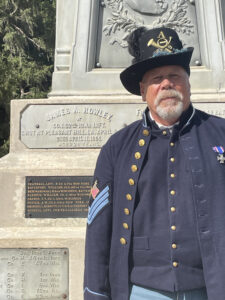Justices hear arguments in long-running whistleblower case
The Iowa Supreme Court heard arguments Tuesday in the long-running case involving a former Division of Criminal Investigation agent who allegedly blew the whistle on a speeding SUV that was carrying then-Gov. Terry Branstad.
On April 26, 2013, DCI Agent Larry Hedlund was headed west on U.S. Highway 20 when he called a law enforcement dispatcher and asked to have troopers stop a Chevrolet Tahoe that he estimated to be doing “a hard 90.” Using radar, troopers later clocked the vehicle’s speed at 84 mph.
Once the troopers recognized the vehicle was carrying Branstad and the then-lieutenant governor, Kim Reynolds, they opted not to pull it over.
Within days, Hedlund — who had no prior disciplinary issues in his 25 years with the agency — was fired. He was accused of sending “negative and disrespectful messages” about DCI leaders in emails to his subordinates, for misusing a state-owned car, and for being “deceptive” about his work status in conversations with his supervisor.
Hedlund, who is now an investigator for the Webster County Attorney’s Office, quickly sued, but after 10 years the case has yet to go to trial, with numerous underlying issues — including Hedlund’s failed efforts to have Branstad sit for a deposition — being litigated.
In 2019, the state challenged Hedlund’s right to sue as a whistleblower, which resulted in an Iowa Supreme Court ruling in the former agent’s favor. At that time, the justices said while the state had argued Hedlund was nothing more than a chronic complainer rather than a whistleblower, his emails to colleagues about the speeding incident recounted the obvious “dangers of traveling at a high rate of speed” and the risk it posed to others.
“This information is not some trivial matter or a subjective disagreement with the actions of a supervisor,” the justices ruled. “The disclosures could reasonably evidence a violation of law or rule, mismanagement, a gross abuse of funds, an abuse of authority, or a substantial and specific danger to public health or safety.”
The justices, however, agreed with the district court judge’s ruling that said Hedlund did not have viable claims for age discrimination or the intentional infliction of emotional distress.
On Tuesday, the justices heard arguments as to whether a 2019 amendment to Iowa’s whistleblower law, allowing plaintiffs to collect a certain level of compensatory damages for lost wages and benefits, is applicable to Hedlund’s case since he was fired six years before the law’s enactment.
Normally, changes to state laws aren’t considered retroactive unless the Iowa Legislature specifies otherwise. But in the past, the courts have ruled that changes that are considered purely procedural, or which provide new remedies for violations such as civil damages, can be treated as retroactive in nature.
A district court judge granted Hedlund’s request to apply the 2019 law to his claim against the state. The state appealed the judge’s ruling, which led to Tuesday’s arguments.
The state now argues the amendment didn’t merely clarify existing state law and was instead a substantive change to that law — so it can’t be applied retroactively.
The amendment at issue provides that individuals who successfully sue for violations of the whistleblower law can collect, as compensatory damages, up to three times their lost wages and benefits.
Three of the justices noted Tuesday that while the nature of amendment clearly creates new remedies available in whistleblower cases, it also appears to be a fairly substantive change, increasing the potential consequences of firing a whistleblower to allow for compensatory damages up to three times the lost salary benefits.
Chief Justice Susan Christensen questioned whether it was fair to retroactively increase the damages that can be collected in such cases.
“If my parents told me, growing up, ‘Susy, if you don’t come in by curfew you’re going to be grounded for a week,’ it might be worth it. I might stay out with my friends. It’s worth it, I’m OK with that. But then if they changed it to be, ‘You’re going to be grounded for a week and we’re taking away your allowance for the next month,’ I might think twice about it. I think we’re underestimating, perhaps, the significance of the civil damages … Doesn’t that seem more substantive?”
Hedlund’s attorney, Thomas J. Duff, said the chief justice’s analogy seemed to speak more to punitive damages than to compensatory damages.
“The case law is pretty clear that when you have an existing statute and you allow for an additional remedy that didn’t exist before, that still makes it retroactive,” Duff said.
Christensen noted that as defined by the whistleblower law, compensatory damages can include an amount that’s up to three times the fired worker’s lost wages and benefits.
“Gosh,” Christensen said. “Couldn’t an employer look at that as being punitive?”
Duff noted that the law doesn’t call for compensatory damages of up to three times the economic loss tied to pay and benefits, but simply caps them at that level.




